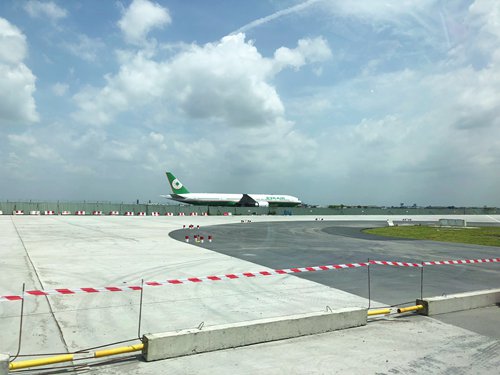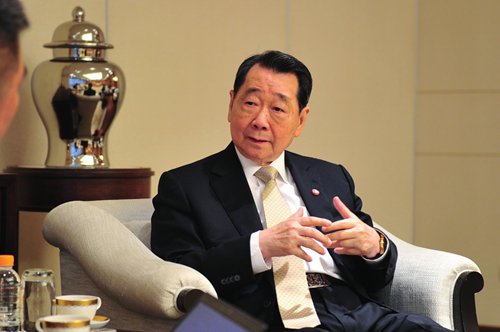


A plane taxis at Bangkok's Suvarnabhumi International Airport. Photo: GT/Chu Daye
Chinese and Japanese firms are encouraged to work together on Thailand's Eastern Economic Corridor (EEC) to transform it into a collaborative multi-stakeholder project for the socio-economic development of emerging markets, a Thai business mogul said.
"Japan seeks to play a role in the development of Thailand's EEC, which complements the China-proposed Belt and Road(B&R) initiative," Dhanin Chearavanont, senior chairman of Thailand's largest private company, Charoen Pokphand Group (C.P. Group), said in an exclusive interview with the Global Times at the headquarters of C.P. Group in Bangkok on Thursday.
"While there is a cooperation agreement at the government level, we want to connect the private sector and entrepreneurs under the B&R principle of achieving shared growth through the spirit of dialogue and collaboration," Chearavanont said.

Dhanin Chearavanont, Senior Chairman of C.P. Group Photo: courtesy of C.P. Group
The EEC is a massive project promoted by the Thai government in recent years. It aims to establish economic zones in Thailand's southeastern provinces of Chachoengsao, Chonburi and Rayong with infrastructure development including high-speed railways, airports and ports.
Many projects in the corridor will use public-private partnerships to attract private investors.
Among them, the "High Speed Rail Linked 3 Airports" project (HSR linking 3 airports), which connects Thailand's Don Mueang Airport, Suvarnabhumi Airport and U-Tapao Airport in the EEC, is considered a key project of the EEC with development rights for key commercial land.
As the Chinese mainland's first foreign investor, C.P. Group has a long track record of investment and partnerships in China.
In additon, the group also has quite strong business ties with companies in Japan.
The company holds cross-shareholdings with Japan's Itochu Corp and is now operating more than 10,000 7-Eleven convenience stores, a Japanese-owned retail chain, in Thailand.
"[The HSR linking 3 airports] is not just for Thai companies to discuss and collaborate. It should also welcome international investment," said Chearavanont.
"When the EEC is transformed into a model of joint discussion, collaboration and shared growth among local and foreign companies, it will turn the attention of companies around the world to Thailand," he said.
In order to export their own domestic high-speed rail technology, China and Japan have engaged in competition in the Thai market in recent years. But this competitive atmosphere is being replaced by a growing spirit of collaboration.
Chearavanont said that he is willing to work together with both Chinese and Japanese companies to jointly develop the High Speed Rail Linked 3 Airports project.
"The HSR linking 3 airports should be technically capable of connecting with the Thailand-China high-speed railway, and it should also be able to connect with European tracks to allow interconnection. It cannot use technology that will be confined to the Thai railway network, nor can it use Japanese technology. It would be best to use European technology to ensure common connectivity. China should also make slight changes in this respect," said Chearavanont.
"[These railways] can eventually be connected with India and Europe in the future, connecting a total of 3 billion people, which would have great social and economic value," said Chearavanont.
Although Thailand has a number of high-speed rail projects under construction or planned, Chearavanont believes that the HSR linking 3 airports project in the EEC will be Thailand's first high-speed rail project to materialize.
 Fire brigade in Shanghai holds group wedding
Fire brigade in Shanghai holds group wedding Tourists enjoy ice sculptures in Datan Town, north China
Tourists enjoy ice sculptures in Datan Town, north China Sunset scenery of Dayan Pagoda in Xi'an
Sunset scenery of Dayan Pagoda in Xi'an Tourists have fun at scenic spot in Nanlong Town, NW China
Tourists have fun at scenic spot in Nanlong Town, NW China Harbin attracts tourists by making best use of ice in winter
Harbin attracts tourists by making best use of ice in winter In pics: FIS Alpine Ski Women's World Cup Slalom
In pics: FIS Alpine Ski Women's World Cup Slalom Black-necked cranes rest at reservoir in Lhunzhub County, Lhasa
Black-necked cranes rest at reservoir in Lhunzhub County, Lhasa China's FAST telescope will be available to foreign scientists in April
China's FAST telescope will be available to foreign scientists in April "She power" plays indispensable role in poverty alleviation
"She power" plays indispensable role in poverty alleviation Top 10 world news events of People's Daily in 2020
Top 10 world news events of People's Daily in 2020 Top 10 China news events of People's Daily in 2020
Top 10 China news events of People's Daily in 2020 Top 10 media buzzwords of 2020
Top 10 media buzzwords of 2020 Year-ender:10 major tourism stories of 2020
Year-ender:10 major tourism stories of 2020 No interference in Venezuelan issues
No interference in Venezuelan issues
 Biz prepares for trade spat
Biz prepares for trade spat
 Broadcasting Continent
Broadcasting Continent Australia wins Chinese CEOs as US loses
Australia wins Chinese CEOs as US loses